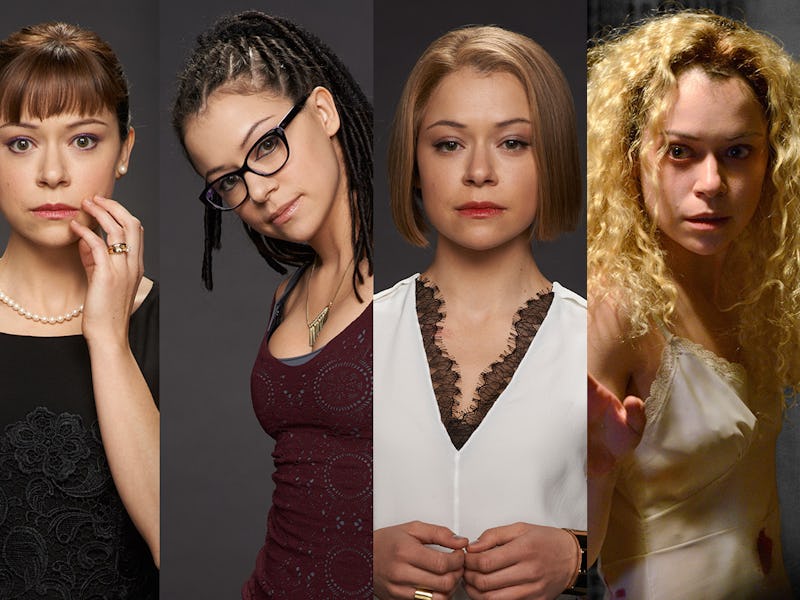For a Show About Clones, 'Orphan Black' Has A Lot To Say About The Individual Self
'Orphan Black''s focus on individuality is what makes a show full of convoluted science so fresh and utterly human.

As Orphan Black approaches the end of its fourth season, it’s been ratcheting up the conversation on ethics while the Clone Club tackles even more nefarious genetic-meddling than its own creation. It’s a show that has been consistently smart with its science, and elevated to greatness by Tatiana Maslany’s mind-boggling performances as 10 different clones.
But underneath, it’s been slowly building up a bold stance on the age-old psychological debate about what defines the Self.
Most of us know this question as the “nature vs. nurture” debate. It’s widely accepted to be a little of both, but scientists are still parsing the question. They have often looked to identical twins to study questions of genetic determinism for both physiological and personality traits. For all we’ve learned about genetics, we still want to know what makes us unique. If secret human clones were a reality, well, science would lose its shit.
Considering that clones are genetically identical, one would assume they have the same inherent nature. The LEDA clones then, seem to be very much the product of their environments. The main clones have had very distinctive upbringings, the most extreme of which was Helena’s life raised by religious whack jobs. We can conveniently ascribe Sarah’s rebellious ways to her tumultuous childhood in foster care (even though Mrs. S is pretty much a rock).
But the truth is we don’t know very much about the upbringings of the other sisters. Beth, Allison, and Cosima are all well-educated women from middle-class families who turn out very differently. How different could Beth’s parents be from Cosima’s, to turn one into a cop and the other into a toking, lesbian scientist?
Gender and sexuality were the first ways that Orphan Black promoted its concept of individual self, above all. Without ever making a fuss or implying that sexuality was a choice, it made one of the main characters gay. Therefore, the show assumes that Cosima’s homosexuality is inherent to her, yet inherent to her cloned “sisters”.
Then, there is the brief and curious appearance of Tony, the trans man clone. It made a big impression for simply being some fairly chill trans representation, but it also threw a very interesting wrench into the concept of identity.
One of the most interesting things about Tony is that after learning that he is a clone, he’s able to walk away, telling Sarah that he’s already done enough introspection about his identity. Although creators hinted he may come back, we haven’t seen Tony since.
So Orphan Black is proposing that identity is inherent — “nature” — yet not necessarily genetic. This aligns with the recent theory of the “Individual Self” being primary over outside influences.
The handling of the CASTOR clones supports this. Although it’s later revealed that they are genetic siblings to the LEDA clones, their upbringing could not have been more different. They were raised by the military and have always been self-aware. So logically, genetic identicals with identical upbringings should be very, very similar, right?
But it still doesn’t quite play out that way. They are more similar than LEDA, yes, but Orphan Black still delivers five distinct characters. Actor Ari Millen gets over looked in Maslany’s massive shadow, but he deserves major props for his roles as the male CASTOR clones. With fewer distinguishing physical features to help us differentiate the clones, Millen puts a unique creepy spin on each of the brothers, who are all deeply disconcerting to watch.
The male clones are noticeably more fucked up for their upbringing. But there is still a large personality difference between Mark, who has defected from the military and tried to find a normal life with the Prolethians (you know you had a terrible childhood when you find normalcy in a cult), and Rudy, the manic, ruthless psychopath. Overall, we get much less screen time with the male clones and can’t really understand their characters. But among the clones raised to be military weapons, Rudy has a distinctly crazier, natural-born-killer vibe about him.
Ultimately, it is all fiction and we can’t draw any real scientific conclusions from fiction. But Orphan Black’s focus on individuality is what makes a show full of convoluted science so fresh and utterly human, it should be a gold standard for sci-fi television. Perhaps the most impressive part of all is that Orphan Black has one of the richest arrays of compelling female characters on television, and they are goddamn clones.